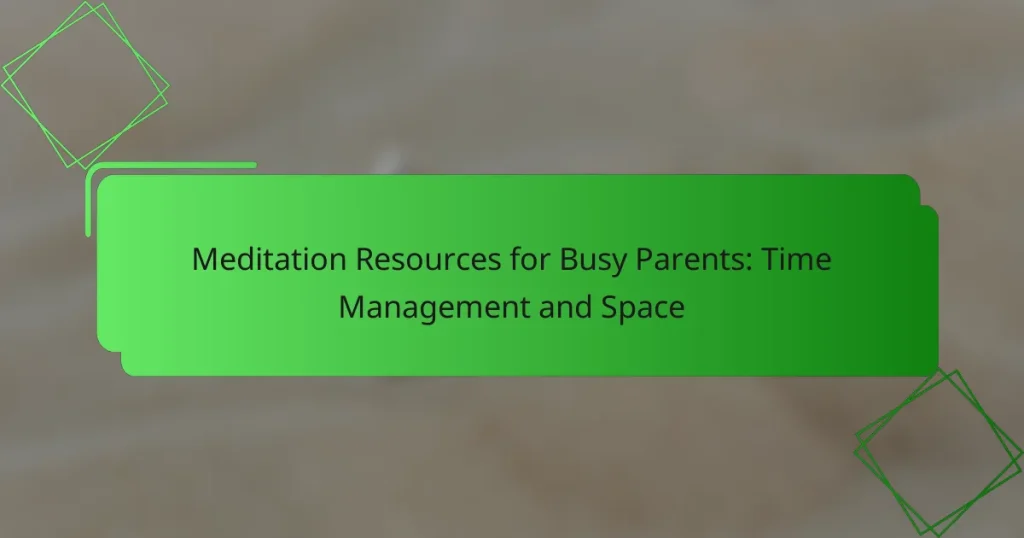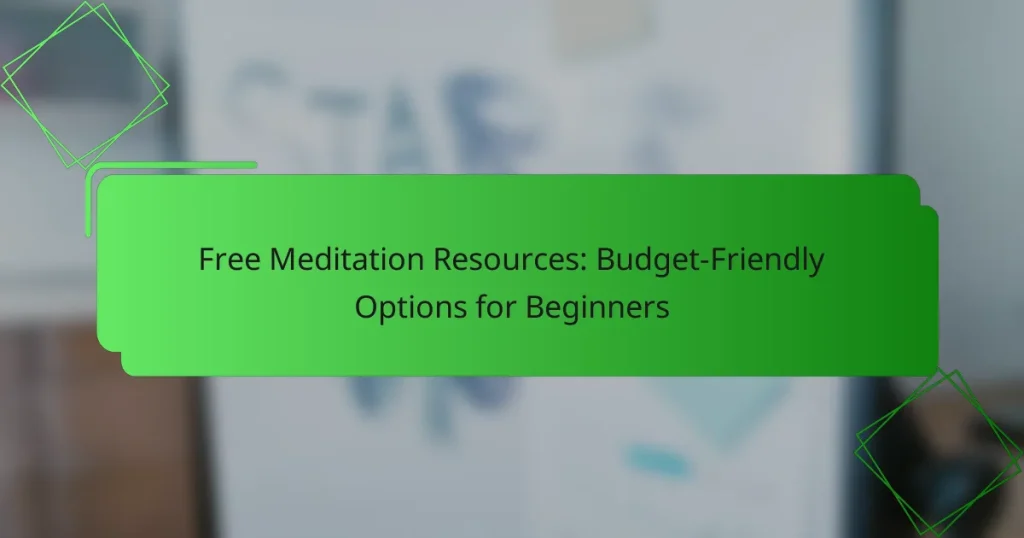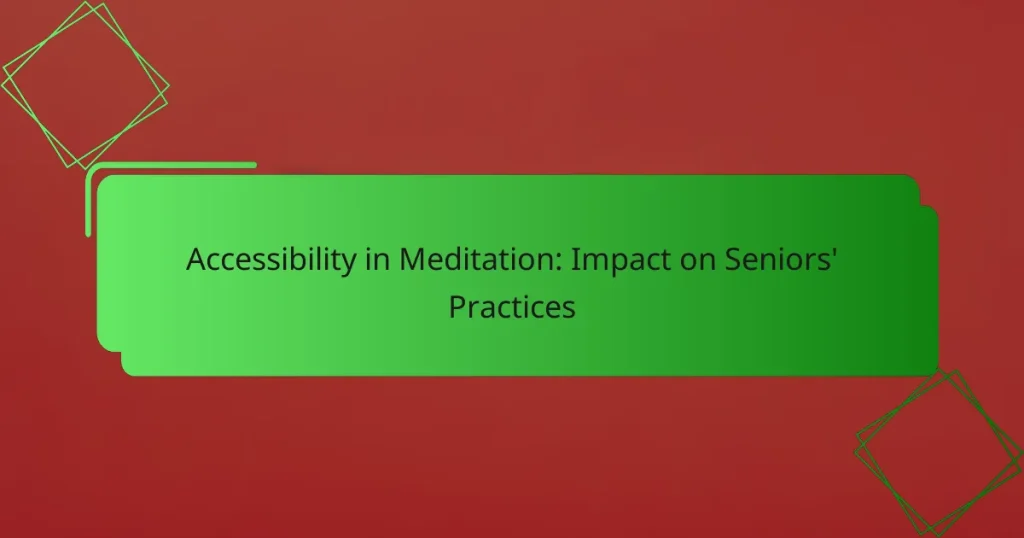Digital wellness tools for meditation are designed to help users cultivate mindfulness and alleviate stress through a variety of features. These resources often include guided meditations, progress tracking, and community support, making it easier to integrate meditation into everyday life. By selecting the right tools, individuals can enhance their mental health, improve focus, and achieve better sleep, ultimately contributing to their overall emotional well-being.
Free Meditation Resources: Budget-Friendly Options for Beginners
Community’s Role: Enhancing Accessible Meditation Practices
Accessibility in Meditation: Impact on Seniors’ Practices
Evaluating Accessibility: Meditation Resources for People with Disabilities
Online vs. In-Person Meditation Classes: Accessibility Comparison
Guided Meditations: Access via Popular Platforms
What are the best digital wellness tools for meditation?
The best digital wellness tools for meditation offer a range of features to help users cultivate mindfulness and reduce stress. These platforms typically include guided meditations, progress tracking, and community support, making it easier to incorporate meditation into daily routines.
Headspace
Headspace is a popular meditation app that provides a variety of guided sessions tailored to different needs, such as stress relief, sleep, and focus. Users can choose from short sessions of just a few minutes to longer practices, allowing flexibility in their meditation schedule.
The app also features animations and explanations that help users understand meditation concepts. A subscription is required for full access, but many find the investment worthwhile for the quality of content offered.
Calm
Calm focuses on meditation, sleep, and relaxation techniques, offering a wide range of guided meditations, sleep stories, and soothing music. Users can select sessions based on their mood or specific goals, such as anxiety reduction or improved sleep quality.
With a user-friendly interface, Calm encourages daily practice and provides reminders to help users stay on track. A subscription unlocks additional content, including masterclasses from mindfulness experts.
Insight Timer
Insight Timer is a free meditation app that boasts the largest library of guided meditations available. Users can explore thousands of sessions led by various teachers, covering diverse topics and styles.
The app also features a timer for self-guided meditation, allowing users to customize their practice duration. Community features, such as groups and discussions, enhance the experience by connecting users with like-minded individuals.
Simple Habit
Simple Habit is designed for busy individuals, offering quick meditation sessions that can be completed in as little as five minutes. The app targets specific situations, such as stress at work or preparing for sleep, making it easy to find relevant content.
With a subscription, users gain access to a broader range of meditations and courses. The app’s focus on short, effective practices helps users integrate mindfulness into their hectic schedules.
10% Happier
10% Happier is geared towards skeptics of meditation, providing practical guidance and insights from experienced teachers. The app offers a variety of courses and guided meditations that focus on real-life applications of mindfulness.
Users can engage with a community of fellow meditators and participate in live events. A subscription is required for full access, but many users appreciate the straightforward approach to meditation that the app offers.
How can meditation apps improve mental health?
Meditation apps can significantly enhance mental health by providing guided practices that promote mindfulness and relaxation. These tools help users manage stress, improve focus, and achieve better sleep, contributing to overall emotional well-being.
Stress reduction
Meditation apps often include features specifically designed to reduce stress through guided sessions and breathing exercises. Regular use can help lower cortisol levels, which are linked to stress, leading to a calmer state of mind.
Many apps offer short sessions, typically ranging from 5 to 20 minutes, making it easy to fit into a busy schedule. Users can select sessions based on their current stress levels or specific situations, such as before a big meeting or after a long day.
Enhanced focus
Using meditation apps can improve focus by training the mind to concentrate on the present moment. Techniques such as mindfulness meditation encourage users to observe their thoughts without judgment, which can enhance cognitive clarity and productivity.
Some apps feature focus-enhancing exercises that last from 10 to 15 minutes, ideal for a quick mental reset during work or study sessions. Incorporating these practices into daily routines can lead to noticeable improvements in attention span and task completion.
Better sleep quality
Meditation apps can promote better sleep quality by helping users unwind and relax before bedtime. Guided meditations and sleep stories are designed to calm the mind, making it easier to fall asleep and stay asleep throughout the night.
Many apps provide specific sleep programs that last between 20 to 30 minutes, focusing on relaxation techniques and soothing sounds. Users are encouraged to establish a nightly routine with these sessions to signal to their bodies that it is time to wind down, ultimately improving sleep hygiene.
What features should I look for in meditation resources?
When choosing meditation resources, prioritize features that enhance usability and effectiveness. Look for tools that offer a user-friendly interface, a variety of meditation styles, and options for progress tracking to support your practice.
User-friendly interface
A user-friendly interface is crucial for a seamless meditation experience. It should be intuitive, allowing users to navigate easily without distraction. Look for apps or platforms that have clear menus, simple layouts, and minimal clutter.
Consider features like voice-guided instructions and customizable settings that can enhance accessibility. A good interface can significantly reduce the time spent figuring out how to use the tool, allowing more focus on meditation itself.
Diverse meditation styles
Diverse meditation styles cater to different preferences and goals, making it essential to choose resources that offer a variety. Look for options such as mindfulness, guided imagery, loving-kindness, or body scan meditations. This variety can help keep your practice engaging and tailored to your needs.
Some platforms may also provide themed sessions, such as stress relief, sleep enhancement, or focus improvement. Experimenting with different styles can help you discover what resonates most with you and enhances your overall experience.
Progress tracking
Progress tracking features can motivate and inform your meditation journey. Look for resources that allow you to log your sessions, track your consistency, and set personal goals. This can help you stay accountable and recognize your growth over time.
Some tools may offer visual representations of your progress, such as charts or streaks, which can be encouraging. However, avoid becoming overly fixated on numbers; the quality of your practice is more important than the quantity of sessions logged.
What are the pricing options for meditation apps?
Meditation apps typically offer a variety of pricing options to cater to different user preferences. These options can range from free trials to subscription plans and one-time purchases, allowing users to choose what best fits their needs and budget.
Free trials
Many meditation apps provide free trials, allowing users to explore features without any financial commitment. These trials usually last from a week to a month and give access to premium content, helping users determine if the app suits their meditation style.
When opting for a free trial, be mindful of the cancellation policy. Some apps automatically transition to a paid subscription if not canceled before the trial ends, which can lead to unexpected charges.
Subscription plans
Subscription plans are a common pricing model for meditation apps, often available on a monthly or annual basis. Monthly subscriptions typically range from around $5 to $15, while annual plans may offer discounts, costing between $30 and $100 per year.
Consider your usage frequency when choosing a subscription plan. If you meditate regularly, an annual plan might be more economical. Always check for any additional features or content included in higher-tier plans.
One-time purchases
Some meditation apps offer a one-time purchase option, allowing users to buy the app outright without ongoing fees. Prices for these apps can vary widely, typically ranging from $10 to $30, depending on the features and content provided.
This option can be advantageous for users who prefer not to commit to a subscription. However, ensure that the app receives regular updates and new content, as some one-time purchase apps may lack ongoing support or new features over time.
How do meditation tools compare in effectiveness?
Meditation tools vary in effectiveness based on user preferences, features, and the specific goals of the user. While some tools emphasize guided sessions, others focus on ambient sounds or customizable experiences, making it essential to choose one that aligns with your meditation style.
Headspace vs Calm
Headspace and Calm are two of the most popular meditation apps, each offering unique features. Headspace is known for its structured courses and user-friendly interface, making it ideal for beginners. Calm, on the other hand, provides a broader range of content, including sleep stories and music, appealing to users looking for a more diverse experience.
When comparing the two, consider your primary goals. If you want to develop a consistent meditation practice, Headspace’s guided sessions may be more effective. If you’re interested in enhancing sleep or relaxation, Calm’s offerings might suit you better.
Insight Timer vs Simple Habit
Insight Timer and Simple Habit cater to different meditation needs. Insight Timer boasts a vast library of free guided meditations and a community aspect, allowing users to connect with others. Simple Habit focuses on short, practical sessions designed for busy individuals, making it easier to fit meditation into a hectic schedule.
For those who prefer variety and community engagement, Insight Timer is a strong choice. Conversely, if you need quick meditative breaks throughout the day, Simple Habit’s concise sessions can be more beneficial.
What are the emerging trends in digital wellness tools?
Emerging trends in digital wellness tools focus on personalized experiences, integration with wearable technology, and the use of artificial intelligence. These tools are evolving to enhance user engagement and provide tailored meditation practices that fit individual needs.
Personalization in meditation apps
Personalization is becoming a key feature in meditation apps, allowing users to customize their experience based on preferences, mood, and goals. Many apps now offer tailored meditation sessions that adapt over time, learning from user feedback and engagement patterns.
For example, some platforms allow users to select specific themes, such as stress relief or sleep improvement, and adjust the length of sessions to fit their schedules. This level of customization enhances user satisfaction and effectiveness.
Integration with wearable technology
Wearable devices are increasingly being integrated with digital wellness tools to track physiological responses during meditation. This integration provides users with real-time feedback on their heart rate, breathing patterns, and stress levels, enhancing the overall meditation experience.
For instance, some meditation apps sync with smartwatches to monitor users’ stress levels and suggest appropriate meditation practices based on their current state. This data-driven approach helps users make informed decisions about their wellness routines.
Artificial intelligence in meditation guidance
Artificial intelligence is being utilized to enhance meditation guidance by providing adaptive recommendations and personalized content. AI can analyze user behavior and preferences to suggest specific meditations or mindfulness exercises that are most likely to resonate with the user.
Some advanced platforms even offer virtual meditation coaches powered by AI, which can interact with users in real time, providing support and motivation. This technology aims to create a more engaging and effective meditation experience.






